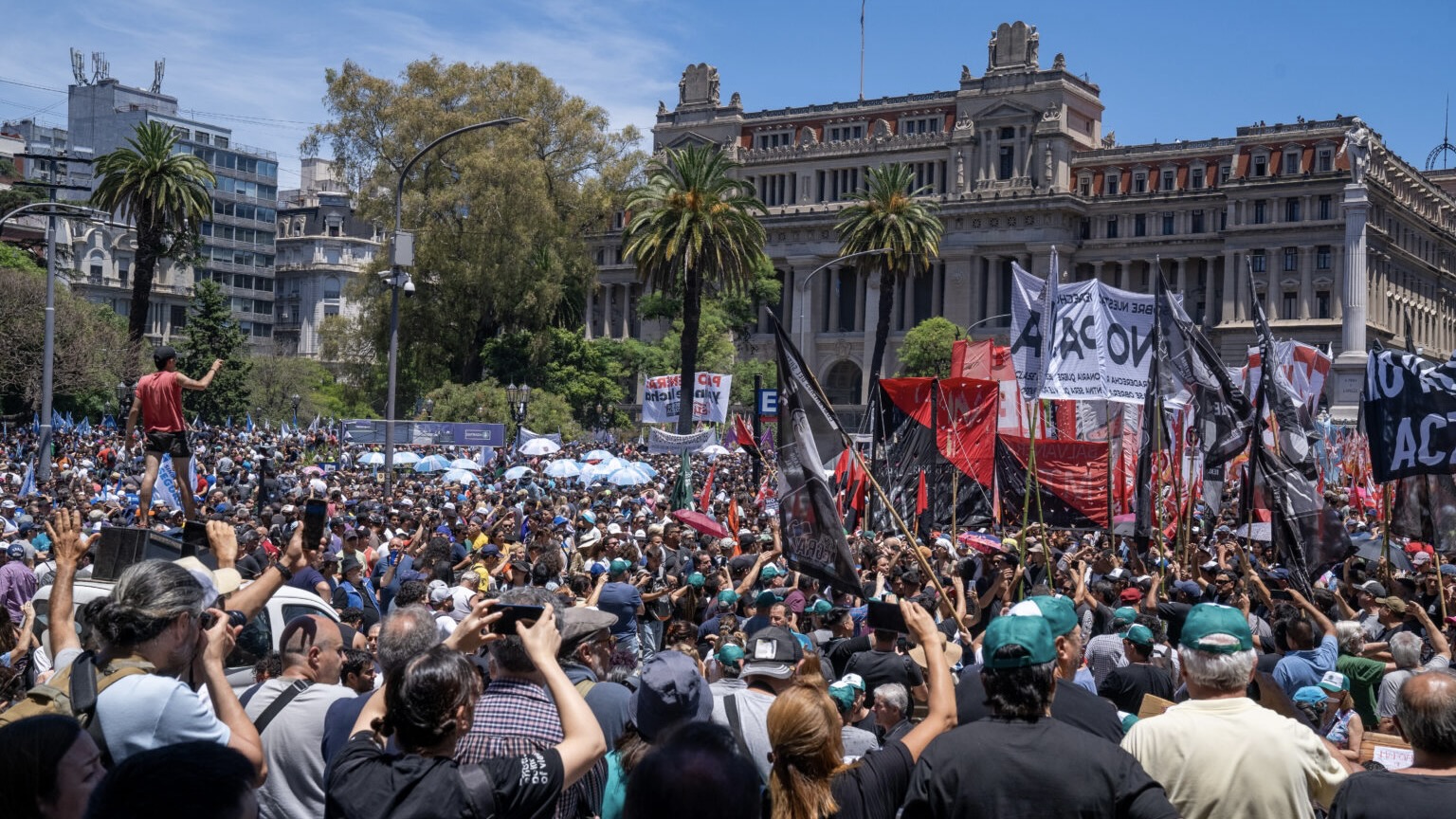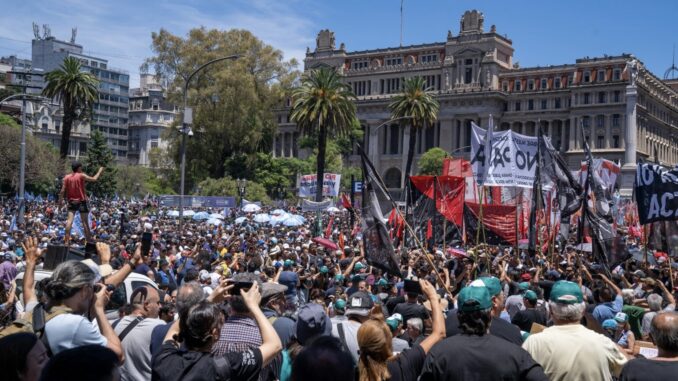

Argentinian masses protest President Milei’s anti-worker policies, Dec. 27, 2023. Credit: peoplesdispatch.com
By Adam Wetzstein
When Javier Milei was inaugurated as Argentina’s president, it was with a promise to break the back of the working class. His goals were clear: Suppress Argentina’s labor movement, sell off the country’s assets to those corporations he handpicked, and definitively align Argentina with the Western imperialist power bloc. Milei demonstrated the last point on his recent trip to Israel when, on his first diplomatic mission overseas, he stood by his promise to move the Argentine Embassy to Jerusalem.
While some of Argentina’s ruling class were skeptical about the self-proclaimed “political outsider,” many Argentine capitalists, big and small, who hire and exploit workers, put their full support behind Milei. The prospect that they could impose low wages and that more of the economy would be privatized was too tempting to pass up.
Now, just three months after beginning his presidency, Milei’s entire legislative program has been shot down in the Chamber of Deputies. His inability to deliver on his pledge is becoming clear even to many former allies. Certain bourgeois elements who fervently supported him just a few months ago have grown skeptical of his ability to deliver. Those who once thought of Milei as a capitalist messiah may be forced to admit they placed their faith in a showboating clown.


Argentinian masses protest President Milei’s anti-worker policies, Dec. 27, 2023.
Credit: peoplesdispatch.com
Why the sudden lack of confidence in Milei among Argentina’s rich? Is it a simple case of incompetence on display? Not remotely. Called by the nation’s largest union group, the Confederación General del Trabajo (GCT), a one-day general strike in Argentina Jan. 24 rattled the country’s capitalist ruling class to its core.
Hundreds of thousands of workers took to the streets and refused to work or shop that day. Demonstrations were not limited to Buenos Aires, Argentina, or even South America. Argentines across the world participated in spontaneous demonstrations at embassies across several continents. Never before has such a demonstration taken place just 45 days into a president’s term.
What sort of resistance can the rulers of Argentina expect after another 45 days, or a year, or two? That Argentine capitalists are beginning to abandon Milei shows they hope to never find out.
Economy remains in crisis
Meanwhile, although hyperinflation is no longer at peak levels, inflation is still out of control. According to Argentine Economics Professor Claudio Katz, Milei intended to tackle the problem using the same playbook President Carlos Menem followed in the 1990s. That is, to induce a recession, lower wages, and hope U.S. dollars will have a stabilizing effect. But the promise of a recession is unattractive to both the working people and Milei’s petit bourgeois supporters.
On Feb. 6, lawmakers rejected Milei’s Omnibus Bill. This bill has been the cornerstone of Milei’s so-called reforms. It proposes the elimination of hundreds of corporate and import/export regulations, the repealing of environmental protections, and the privatization of countless state assets. Now, the Omnibus Bill has failed to pass through even the lower house of Parliament, the Chamber of Deputies.
Finance capital, too, is distancing itself from Milei, with JP Morgan’s Chief Economist in Argentina Diego Pereira urging Milei to change course. Pereira is on record saying, “This is an unprecedented event, and there is no memory of an administration having its first piece of legislation rejected.” (CNBC, Feb. 7)
Former allies fleeing ‘sinking ship’
Milei’s allies may be a who’s who of Argentine industrialists and big-money men, but with few friends in government and former allies fleeing the sinking ship, it is doubtful the fledgling president will be able to push his radical right-wing program through.
The Milei administration’s efforts to counter the movement of the people reek of desperation. Multimillion-dollar fines placed on unions and individual organizers, violent police tactics, and emergency decrees limiting or outright banning public assembly have failed to silence Milei’s opposition. If anything, Argentina’s largest labor unions have gained a boost in popularity and are witnessing opportunities they haven’t seen in years.
Milei’s inability to quiet the people or halt the movement of Argentina’s labor unions has no doubt terrified Argentine capitalists, as it should. The members of the ruling class that elected Milei did so hoping he would crush the workers, not embolden them.
Only time will tell the outcome of Milei’s destructive tenure as president, and even how long he will cling to power. Argentina’s old guard, the conservative Peronist parties, are acting as if they expect this episode with Milei will end quickly, with the reins of society once again passing into their hands.
The working people in Argentina and workers across the world can hope for something better. Not a continuation of Milei’s reckless administration, or a return to what was happening before, but something new, with the people taking stronger control of their own destiny.
The following call, “Gaza cries out to you – A global solidarity week to support…
Ever since the Donald Trump/Elon Musk administration took the reins of power in late January,…
The following is a letter from Workers World Party to the Workers Party of Korea…
Statement of the anti-imperialist Citizens’ Pole organization in Panamá, issued April 10, 2025. Translation: John…
Philadelphia Philadelphia’s transit system, the Southeastern Pennsylvania Transit Authority (SEPTA), released a budget on April…
By Gary Wilson The following is a guest article published first on April 10, 2025…